Giving our goats special treats is a wonderful way for us to bond with them and make them super happy.
Goats love to munch and eat just about anything.
While we want to give our goats special treats, knowing what is okay to eat or potentially dangerous is vital.
Being a responsible goat owner is staying up to date and gaining as much goat knowledge as possible.
With this convenient access table, we’ll let you know what vegetables are safe for goats to eat and which are dangerous.
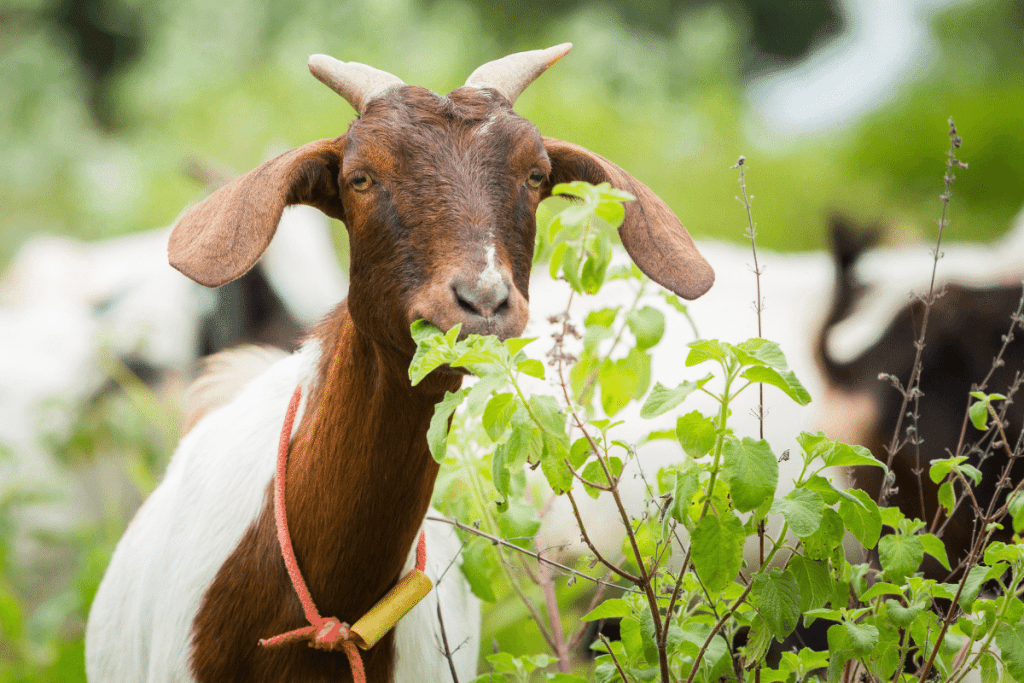
Table of Contents
ToggleGoat Vegetable Access Table
| Vegetable | Good | Bad |
|---|---|---|
| Cucumber | ✅ | |
| Cucumber Peelings | ✅ | |
| Avocado | ❌ | |
| Corn | ✅ | |
| Zucchini | ✅ | |
| Kale | ❌ | |
| Broccoli | ✅ | |
| Raw Potatoes | ❌ | |
| Cabbage | ❌ | |
| Celery | ✅ | |
| Rhubarb | ❌ | |
| Tomato | ❌ | |
| Lettuce | ✅ | |
| Carrots | ✅ | |
| Onions | ❌ | |
| Spinach | ✅ | |
| Squash | ✅ | |
| Eggplants | ❌ | |
| Pumpkin | ✅ |
Cucumbers
Cucumber is good. ✅
Cucumbers are a great snack for goats.
Feel free to feed them whole or chopped.
They are a great way to hydrate in the heat of the summer months.
The high water content in cucumbers makes them an excellent choice for keeping our goats hydrated and healthy during the hot summer months and providing adequate water.
Further reading: How hot is too hot for a goat?
Cucumber Peelings
Cucumber peelings are good. ✅
Cucumber skin is a fantastic choice for a healthy snack for our goats to munch on.
The cucumber peels have the highest fiber content of the whole vegetable.
Giving them to our goats allows them to get an extra boost of fiber in their diet.
Avocado
Avocados are bad. ❌
Unfortunately, sharing our delicious avocados with our goats is very bad.
Avocados contain persin, which is extremely toxic to goats.
They do not possess the ability to properly digest the amounts of persin, and severe injury or even death may occur after consumption of the fruit and leaves of avocado trees.
Many animals aren’t able to digest avocados.
The amounts of persin in avocados are not dangerous for humans because our digestive systems process it well.
Corn
Corn is good. ✅
Corn is a great snack choice for goats but be careful to give it to your goats in moderation.
Too much corn may be a bad thing for goats.
It is also crucial to only give ground corn to your goats as goats have difficulty digesting the whole kernels.
This is one to tread lightly with as there is potential for injury or digestive problems.
Zucchini
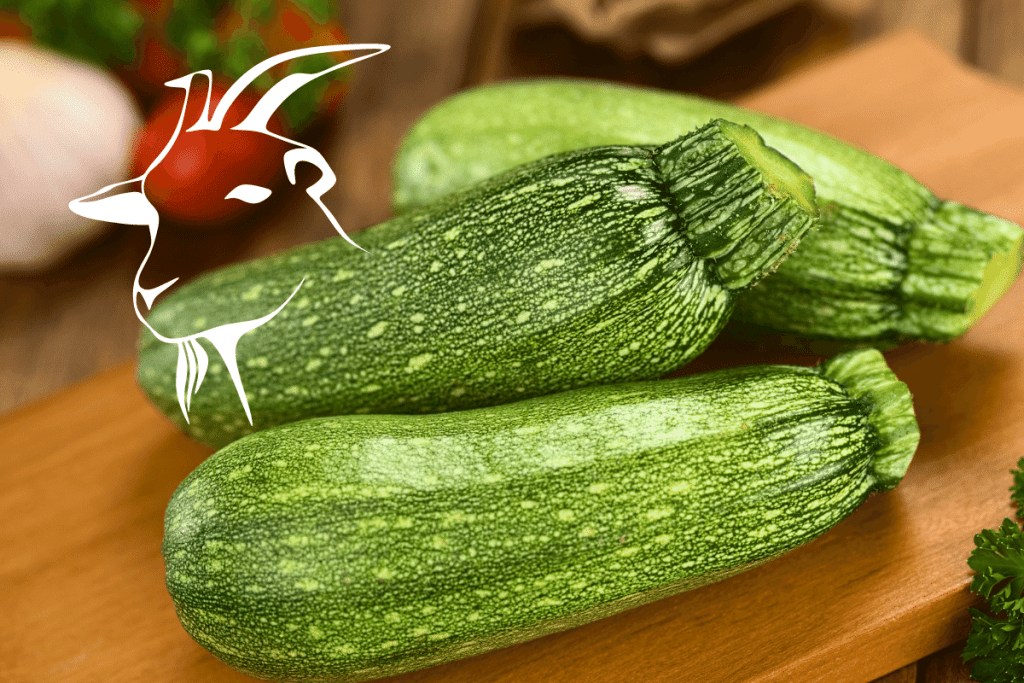
Zucchini is good. ✅
Zucchini is a delicious and healthy treat for our goats.
Like other snacks, they should be fed in moderation.
Some goat owners find their goats to be uninterested in zucchini.
It is not a vegetable every goat loves, but it is worth offering to see if they like it.
Kale
Kale is bad. ❌
Kale is a type of dark leafy green.
Many of the dark leafy greens contain high levels of oxalates.
Oxalates are not good for goats.
Some farmers find kale in small quantities to be fine.
Still, we recommend avoiding this to reduce the chance of any digestive upset or health problems, especially for baby goats who may not be able to hand even small amounts.
Broccoli
Broccoli is good. ✅
Broccoli is as healthy and nutritious for your goats as ours.
Feel free to give both raw and steamed broccoli to your goats.
Giving healthy treats is especially important for baby goats and pregnant goats as they often require more nutrients.
Some goats prefer the crunch of raw broccoli, while others find the flavor and texture of lightly boiled broccoli more appealing.
Raw Potatoes
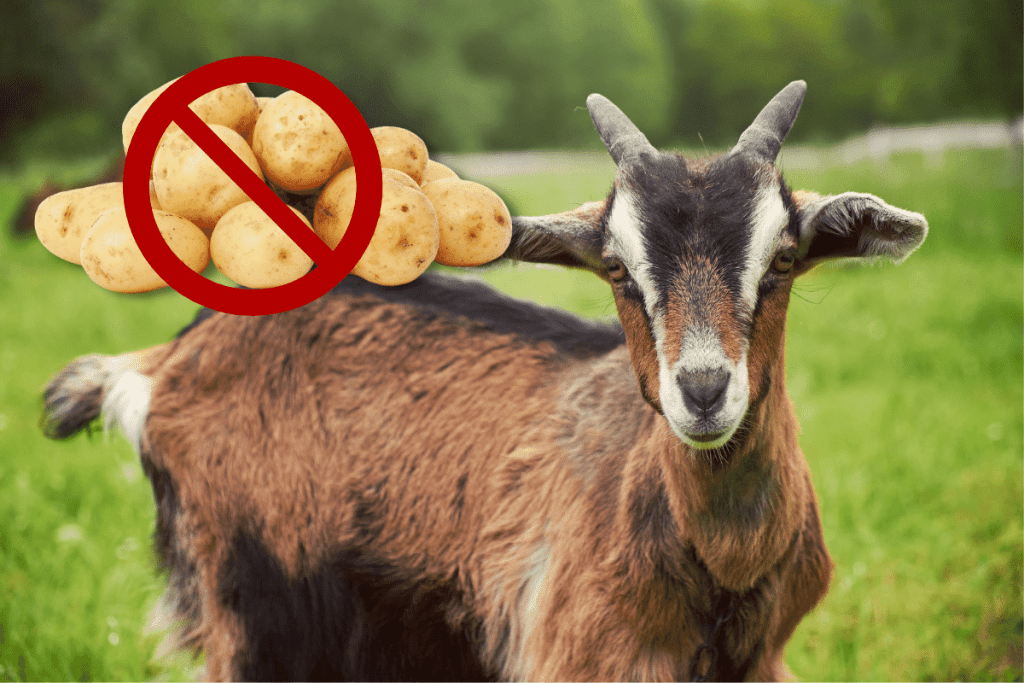
Raw potato is bad. ❌
Raw potatoes are awful for ruminants.
Green potatoes, raw potatoes, and actual potato vines are highly toxic to goats.
They contain solanine.
Goats poisoned by solanine from a raw potato will exhibit various signs, from lethargy and vomiting to heart issues and death in high quantities.
Avoid giving any part of them, even a bit of potato plant, to your healthy goats.
Some people wonder about fried potatoes.
Fried potatoes have a lot of oil and sodium, which are not good for goats.
Cabbage
Cabbage is bad. ❌
Consumption of cabbages by goats is very dangerous.
Accidental ingestion of cabbages from your garden is cause for concern.
We recommend keeping your garden safe with strong boundaries to prevent the consumption of cabbages by your goats.
Celery
Celery is good. ✅
Goats tend to love the fresh and crisp crunch of raw celery.
Celery packs lots of vitamins and nutrients.
The healthy vegetable also packs a high water content, making it an excellent snack for when temperatures are rising in the summertime.
Rhubarb
Rhubarb is bad. ❌
Rhubarb contains oxalic acid, which is very toxic to goats.
The rhubarb plant’s toxic ingredients lead to severe issues.
Allowing access to rhubarb plants is not a good idea.
Goats mostly ignore them but will eat them if they are hungry and have access to rhubarb plants.
Oxalic acid poisoning may lead to heart issues, bloat issues, milk production issues, and other issues for your goat herd.
Tomato
Tomatoes are bad. ❌
While the actual fruit of the tomato plant is okay in extreme moderation as occasional treats, the rest of the plant is highly toxic.
It contains certain alkaloids which are dangerous for your goat herd in excess.
Unripe tomatoes, tomato vines, and tomato leaves will cause gastrointestinal distress in goats and other farm animals.
Goat herds find tomato plants toxic and will avoid eating them, which helps prevent chronic poisoning.
Lettuce
Lettuce is good. ✅
Goats love lettuce.
Most goats thoroughly enjoy the freshness and crunch of raw lettuce.
It is a great treat for your goats.
Many goat farmers find adding some lettuce to their regular feed helps to encourage their goats to eat their food.
Like other healthy treats, avoid giving to your goats in excessive amounts, but it is a smart choice when choosing a special treat.
Carrots
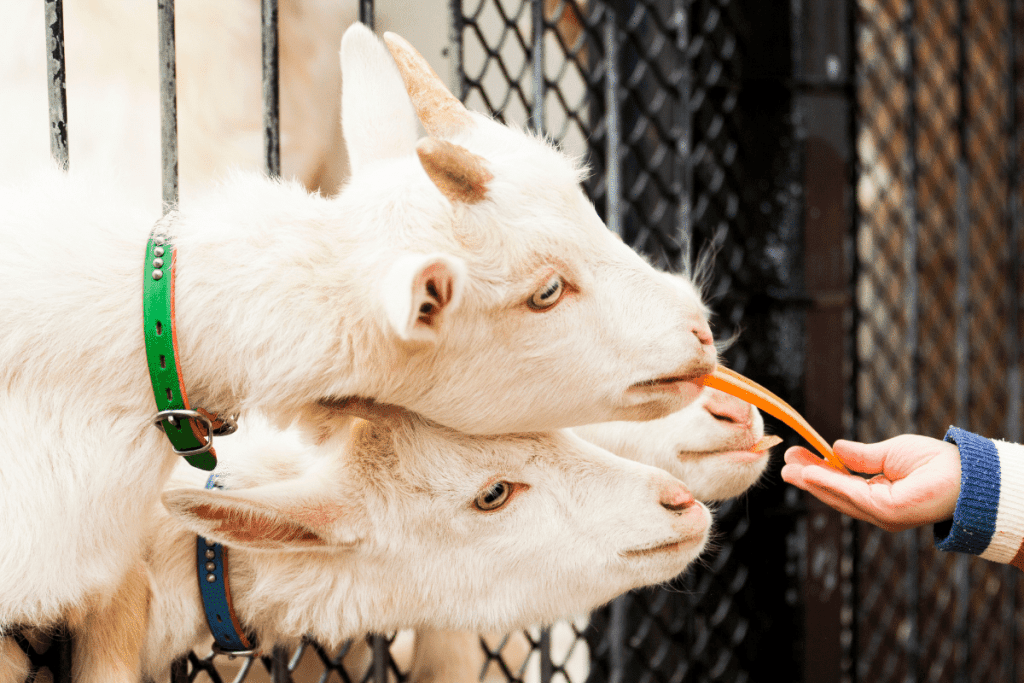
Carrots are good. ✅
Carrots are a great snack for goats.
Both the carrot greens and vegetables are safe for goats to eat.
Many goats thoroughly enjoy the crunch of snapping a carrot or gnawing on a delicious vegetable.
It should be given in moderation, but an occasional carrot snack will make your goats very happy and maintain a healthy body weight.
Carrots also pack healthy fiber, an essential part of a balanced diet.
Onion
Onions are bad. ❌
Onion is not a good snack for goats.
Most people consider goats to be a bit more resistant to the negative effects caused by eating onions compared to other animals; they still suffer.
Long-term onion consumption leads to many health issues, including anemia, increased heart rate, collapse, and death in extreme cases.
Avoid giving onions to your goats even as an occasional treat.
Spinach
Spinach is good. ✅
We are all familiar with how spinach helps make us healthy and strong.
The same is true for goats.
Goats also benefit from the vitamins and nutrients in healthy treats like spinach.
However, it is essential to feed in moderation.
Snacks and special treats are great, but they should never make up most of your goats’ diet.
Give snacks and spinach to your goats as an occasional treat.
Squash
Squash is good. ✅
There are many different types of squash for your goats to enjoy.
Many goat farmers report their four-legged friends particularly enjoying butternut and acorn squash.
It’s fun to give our goats a few different types of squash to see which they enjoy the most.
Feel free to treat your goats to a special squash snack here and there to complement their healthy diet.
Eggplant
Eggplant is bad. ❌
Eggplant is a member of the nightshade family.
Nightshade varieties are toxic to goats.
They have a tough time digesting members of the nightshade family.
Consumption of eggplants and other nightshades leads to gastrointestinal upset and, in extreme cases, death.
Keep your goats away from eggplant plants and other nightshade family members.
Pumpkin
Pumpkins are good. ✅
Pumpkin is a great occasional treat for goats.
It is packed with healthy vitamins and minerals as well as nutritious fiber.
While it is not a good idea to toss a whole pumpkin to your goats, they will enjoy the flesh and chopped-up pumpkin.
What Else Should I Avoid Giving My Goats?
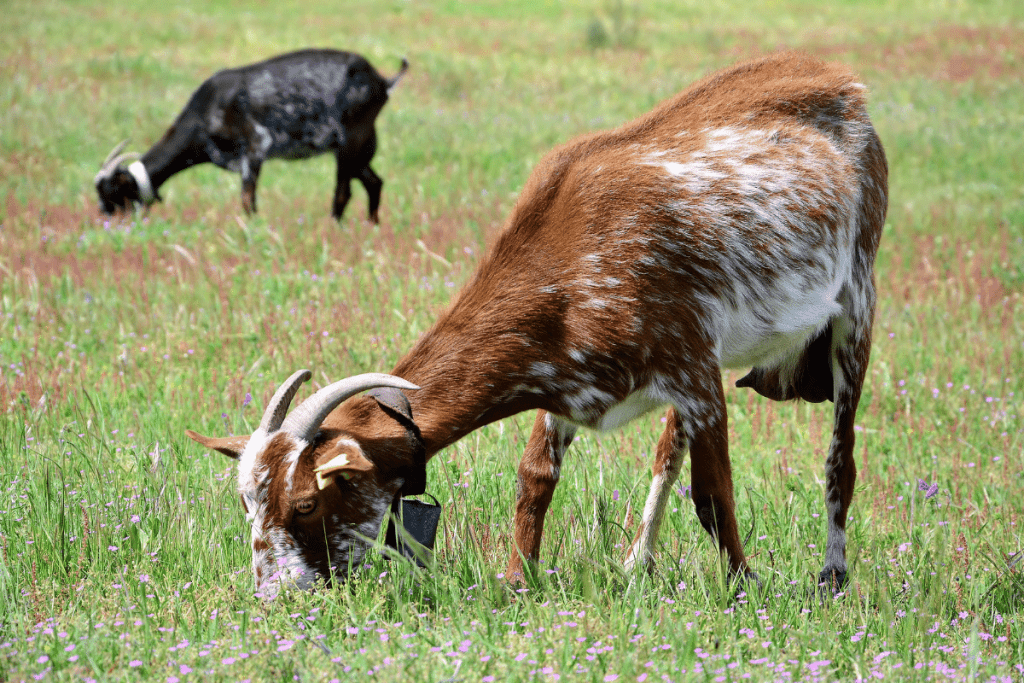
Goats carry a reputation for eating just about anything, including the shirt off your back.
While this does hold some truth, goats are also intuitive about what they should and shouldn’t eat.
Making sure most of our goats’ diet consists of their regular sweet feeds helps to ensure all their nutritional needs are met.
Supplementing sweet feeds with vegetables is a great way to provide a tasty snack.
It also helps us to form a closer bond with our goats.
However, snacks and treats should never replace our goats’ sweet feeds, especially if it starts impacting body weight.
When we give snacks to our goats, it is crucial for us to only give them safe food items.
Giving our goats toxic food items will cause health issues and even death in extreme cases.
Other items like citrus fruit are okay in moderation.
There are also some flowering plants like the Calotropis plant, which is highly toxic.
If your goat forages too much, they are also susceptible to nitrite poisoning from eating too many plants with nitrites.
Here are a few other items we recommend keeping far away from your goats.
Chocolate
Chocolate is toxic to goats.
It contains caffeine which does not sit well with goats.
Chocolate contains an ingredient called theobromine.
Theobromine is incredibly toxic to goats and should be avoided at all costs.
The caffeine from chocolate products is equally bad.
This means they are poisonous and will cause serious injury to goats even if they are fine for us to eat.
Garlic
Garlic is another food item unsuitable for goats.
Too much causes gastrointestinal upset and other health issues.
Some farmers use garlic as a natural dewormer, but we highly recommend speaking with your veterinarian before giving garlic to your goat.
There is some debate about whether garlic is safe for goats, but we recommend erring on the side of caution until you get a professional opinion.
Coffee
Coffee should not be given to goats.
While we may love the caffeine in coffee to get us going in the morning, this same caffeine is quite dangerous for goats.
Like the theobromine in chocolate, caffeine from coffee poses some significant risks.
There are many other suitable snacks and special treats to occasionally give to our goats, so avoiding coffee should be no problem.
Meat
Goats should never eat meat.
They are naturally herbivores and don’t digest meat well.
While it is tempting to toss our leftovers to our farm animals, it is crucial to practice caution.
Meat is not suitable for the digestive tracts of goats and should never be given even as a special treat.
Further reading: Can goats safely eat meat?
Cooked Human Food
The mentality of a farmer is often waste not and want not.
Sometimes this tempts us to give our table scraps and leftovers to our farm animals.
While our intentions are good, the consequences are often dire.
We usually like to cook our meals with lots of oils and seasonings to make them delicious and enjoyable.
While they may make our dinners better, these oils, salts, and seasonings are not suitable for goats.
However tempting it may be to clear off your plate in the goats’ feed, we highly recommend avoiding this.
It will cause gastrointestinal upset and other health issues.
Cherries
Cherries are not good for goats.
Cherry leaves are incredibly toxic.
The wilted leaves of a cherry tree are toxic.
We recommend keeping your goats far from the cherry leaves if you have a cherry tree.
Both the fresh leaves and the wilted leaves of the plant are poisonous.
Even leaf fragments should be kept away.
Some fruits are good for goats, though.
Check out the best and worst fruits for goats on our list.
Stone Fruit
Stone fruit is not good for your goat herd.
Consumption of the pits or seeds from these foods leads to cyanide poisoning.
If you have stone fruit trees, become familiar with the symptoms of cyanide poisoning.
Cyanide, also called prussic acid, is fatal to goats.
Being able to pick on an early sign of cyanide poisoning may make the difference.
Some symptoms of cyanide poisoning include muscle tremors, mouth salivation, difficulty breathing, and collapse.
Moldy Foods
Moldy foods are not okay to give to goats.
Moldy foods in their regular feed often cause the side effects of grain and fodder poisoning.
High amounts in goats will cause severe problems to healthy goats but are especially harmful to pregnant animals.
Why Do Goats Have A Harder Time Digesting Things?
Ruminants have four stomachs which are very different from our singular one.
The way goats digest food is not at all like we do.
They have different enzymes and processes.
Ruminants with multiple stomachs are more prone to bloat issues, contributing to gastrointestinal upset and other health issues.
For this reason, we must be very mindful of what we feed our goats.
Just because it is safe and healthy for us to eat does not mean it will be the same for goats.
Keep this in mind before tossing any food items to your goats.
We want to treat them and make them happy, but their health comes first, so consult our handy table before giving any vegetables to your beloved goats.
Read next: Can goats eat llama food?
How useful was this post?
Click on a star to rate it!
We are sorry that this post was not useful for you!
Let us improve this post!
Tell us how we can improve this post?
